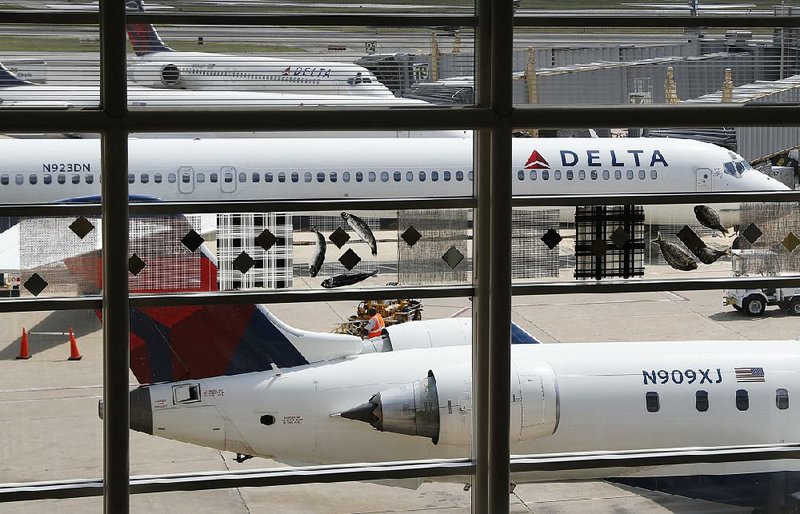NEW YORK -- Lower airfares and rising salaries are putting a squeeze on Delta Air Lines.
Luckily for the airline, the price of jet fuel remains cheap and the Atlanta-based carrier was able to report Thursday a third-quarter profit of $1.26 billion, down 4 percent from the same period last year.
Summer is typically the strongest period for U.S. airlines, economists said, and Delta's earnings could signal and end of an extraordinary run of record profits for the industry. The issue is that this era of cheap fuel isn't going to last forever.
Delta -- which is the first major U.S. airline to report earnings -- paid $1.50 for each gallon of jet fuel in the quarter, down from $1.89 during the same period last year. An oil refinery owned by Delta in Pennsylvania lost $45 million in the quarter, yet possession of the facility gives the airline a 3-cent-per-gallon fuel advantage over competitors.
Every penny per gallon saved adds up with the airline consuming 1.1 billion gallons of fuel during the quarter. Delta warned in its earnings release that, for the first time in several years, year-over-year fuel prices will be higher in the next quarter.
After posting more than $56 billion in industry profits since 2010, U.S. airlines are now struggling with too many seats in the sky, lower airfares and increased costs for most nonfuel expenses including salaries and payments for new aircraft.
The amount of money Delta collected for each mile that each available seat flew plunged 6.8 percent during the three months that ended Sept. 30.
The average airfare for each 1,000 miles passengers flew during the summer was $153.80, down 5.3 percent from the $162.40 Delta collected during the same period last year.
The number of available seats and the miles they flew increased 1.5 percent while the actual flying by paying customers fell 0.2 percent. A year ago, 86.8 percent of Delta's seats were filled with paying passengers during the peak July, August and September quarter. That fell this year to 85.4 percent.
Delta, the world's second-largest airline by passenger traffic, said it plans to slow its growth to 1 percent in the next quarter and into 2017 so it can try to raise airfares. It hopes that its industry-leading on-time performance will persuade travelers -- especially higher-paying business fliers -- to book with Delta and possibly pay more to do so.
Delta indicated on a call with investors that airfares may have hit their low point.
The airline's president, Glen Hauenstein, said that within the next 90 days he expects more than half of Delta's routes to see higher year-over-year revenue per available seat. In the past six to eight weeks, the airline has seen airfares climb on last-minute bookings.
Latin America routes, which have been hammered by regional economic troubles, saw revenue per available seat climb 1.4 percent.
However, lucrative trans-Atlantic routes fell 9.7 percent, something Hauenstein attributed to the growth of low-cost airlines in that market, terrorism fears and Great Britain's vote to leave the European Union and the subsequent drop of the country's currency.
"We continue to be cautiously optimistic," Hauenstein said.
While Delta is taking in less cash, it's also paying out more.
The number of full-time equivalent employees rose 1.3 percent to 84,084. Salaries and benefits jumped 8 percent to $2.5 billion. And that doesn't factor in a proposed new pilot contract that would drive up Delta's wage expenses more.
Delta also continued to replace its aging fleet of jets, leading to a 14-percent increase in its aircraft payments. Its fleet climbed from 925 jets to 960 in the past year. The new jets also have more seats than those they are replacing, making it even harder for Delta to easily pull down its capacity and increase airfares.
Overall, Delta's revenue for the quarter fell 6 percent to $10.48 billion from $11.11 billion last year and fell short of Wall Street forecasts. Four analysts surveyed by Zacks Investment Research expected $10.59 billion. The airline said $100 million of that shortfall was a result of an August computer system failure that grounded its planes around the globe and led to more than 2,300 flight cancellations. Another $70 million in the gap came because of gains last year from currencies bets on the Japanese yen.
On a per-share basis, the Atlanta-based company said it had profit of $1.69. Earnings, adjusted for nonrecurring costs, came to $1.70 per share. That profit surpassed Wall Street expectations. The average estimate of nine analysts surveyed by Zacks was for earnings of $1.65 per share.
Delta shares rose 74 cents, or 1.9 percent, to close Thursday at $40.01. Before Thursday, the stock had declined almost 20 percent in the past 12 months.
Business on 10/14/2016

